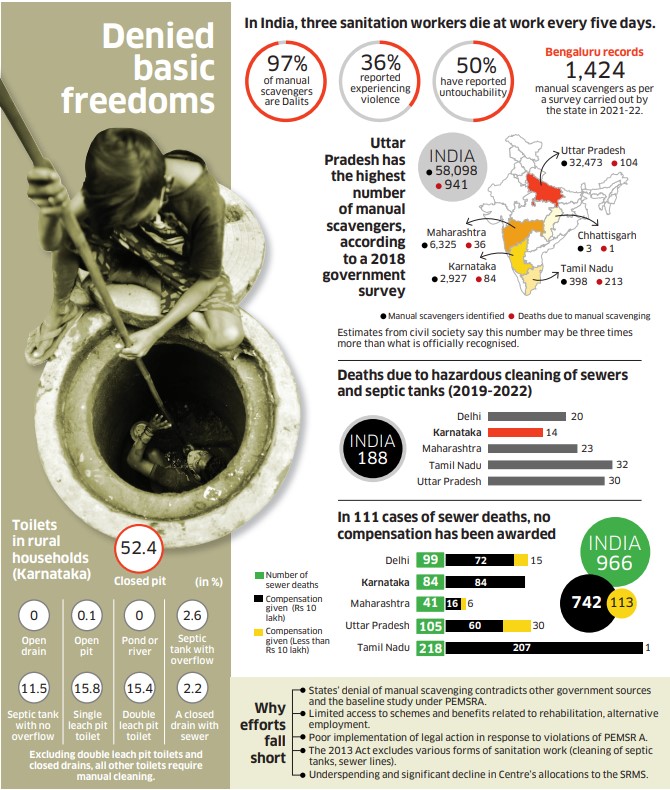530 districts reported as free of manual scavenging: Centre
Context
According to the Ministry, 530 districts have so far reported being free of manual scavenging, with the remaining districts having yet to do so. According to the Ministry, manual scavenging is no longer practised in the nation.
What is manual scavenging?
- Manual scavenging is the practise of removing human waste from public areas like streets, dry restrooms, septic tanks, gutters, and sewers.
- It is regarded as a dehumanising practise and is associated with the caste system in India, where people from lower castes are frequently compelled to do this labour because of societal discrimination.
What are the reasons behind the prevalance of Manual scavenging?
- Apathy: Some state governments are reticent to accept the persistence of manual scavenging under their supervision, which results in poor reporting and response.
- Problems with outsourcing: Local governments frequently contract out the cleaning of sewage systems to private companies, who may not keep accurate records of their sanitation staff. In the event of mishaps, these contractors may deny affiliation with the deceased workers.
- Social issue:Manual scavenging is ingrained in caste, class, and income strata of society, which is a social issue. This work has long been given to members of lower castes, and despite being made illegal, stigma and discrimination still surround it.
What is the present status of Manual scavenging as per the government?
- According to the Ministry, 530 of the total number of districts have proclaimed themselves free of manual scavenging, with the other districts having yet to do so.
- 100% of the districts in various states, including Bihar, Rajasthan, Tamil Nadu, and others, have been deemed free of manual scavenging.
- There are several States and Union Territories, though, where there are still a sizable number of districts where manual scavenging is still practised. Jammu and Kashmir, Manipur, Telangana, Andhra Pradesh, West Bengal, and Jharkhand are some of these regions.
- In Manipur, only two out of 16 districts have reported being free of manual scavenging. Similarly, Jammu and Kashmir and Telangana have only 30% of their districts declared as free.
- The Union government claims that there have been no deaths due to manual scavenging in the past five years. However, it is reported that 330 people have died during the cleaning of sewers and septic tanks.
What are the laws that are in place to eradicate this practise?
- The Prohibition of Employment as Manual Scavengers and their Rehabilitation (Amendment) Bill, 2020:
- Complete mechanisation of sewer cleaning is suggested in order to do away with hand scavenging.
- introduces on-site safety precautions to guarantee the security of sewage cleaning personnel.
- compensates the families of manual scavengers in the event that their loved ones pass away while performing sewer cleaning.
- An amendment to the 2013 Prohibition of Employment as Manual Scavengers and their Rehabilitation Act is being proposed in an effort to tighten the legislation’s provisions for outlawing the practise and rehabilitating those who are harmed by it.
- The Building and Maintenance of Insanitary Latrines Act, 2013:
- prohibits the building or upkeep of unhygienic restrooms.
- prohibits paying people to clean septic tanks and sewers in a dangerous manner or to perform manual scavenging.
- mandates the government’s constitutional obligation to offer alternative employment opportunities and other support to communities who rely on physical labour, redressing historical injustices and indignities suffered by them.
- Scheduled Castes & Scheduled Tribes (Prevention Of Atrocities) Act, 1989:
- by stopping crimes and discrimination against sanitation employees, especially those from Scheduled Castes, one becomes an integrated guard for them.
- plays a key role in releasing manual scavengers from specific conventional professions; more than 90% of individuals working in manual scavenging are from Scheduled Castes.
- Safaimitra Suraksha:
- on November 19, 2020, World Toilet Day, the Ministry of Housing and Urban Affairs will officially launch the programme.
- by April 2021, sewer cleaning will be automated across all states.
- ensures the safety of those who must enter sewer lines during inevitable crises by giving them the required equipment and oxygen tanks.
- Swachhta Abhiyan App :
- developed to locate and geotag information from unclean latrines and human scavengers.
- aims to give manual scavengers a life of dignity by rehabilitating them and replacing unsanitary latrines with hygienic ones.
What are the ways forward to eliminate this practice?
- Strengthening laws: Ensure strong implementation of legislation like the 2013 Prohibition of Employment as Manual Scavengers and their Rehabilitation Act and the 2013 Building and Maintenance of Insanitary Latrines Act to strengthen and enforce current laws. Punish those who engage in manual scavenging, including employees, contractors, and employers.
- Encourage Mechanisation: To fully automate the process, invest in cutting-edge tools and technology for sewage and septic tank cleaning. As a result, less manual labour is required, and sanitation work is safer and more effective.
- Promote Alternative Livelihoods: Give manual scavengers the training and assistance they need to switch to alternative occupations. Programmes for skill development and access to employment prospects in other industries can aid in ending the cycle of manual scavenging.
- Create Awarness:Communities should be made aware of and made more sensitive to the risks associated with manual scavenging as well as the laws that forbid it. Make people aware of the rights and respect owed to sanitation employees.
- Incorporate Manual Scavenging in Education: Include the issue of manual scavenging in school curricula to sensitize the younger generation about its inhumanity and importance of eradicating the practice.
- Public-Private Partnerships: Foster collaborations between the government, private sector, and civil society organizations to collectively work towards eliminating manual scavenging.





